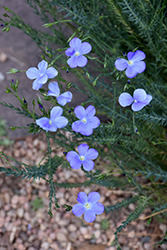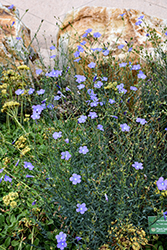It's all about ...
plants

Height: 18 inches
Spacing: 16 inches
Sunlight:
![]()
![]()
Hardiness Zone: 6a
Other Names: Spanish Blue Flax, Mediterranean Blue Flax
Brand: Plant Select
Description:
This long lived variety produces tufts of narrow, blue-green foliage that is smothered by prolific sky blue blooms with white centers from mid spring to mid summer; great for borders or rock gardens; heat and drought tolerant; best flowering in full sun
Ornamental Features
Narbonne Blue Flax features airy sky blue cup-shaped flowers with white eyes and royal blue veins at the ends of the stems from mid spring to mid summer. Its tiny narrow leaves remain bluish-green in colour throughout the season.
Landscape Attributes
Narbonne Blue Flax is an open herbaceous perennial with an upright spreading habit of growth. It brings an extremely fine and delicate texture to the garden composition and should be used to full effect.
This is a relatively low maintenance plant, and is best cleaned up in early spring before it resumes active growth for the season. It is a good choice for attracting bees and butterflies to your yard, but is not particularly attractive to deer who tend to leave it alone in favor of tastier treats. Gardeners should be aware of the following characteristic(s) that may warrant special consideration;
- Self-Seeding
Narbonne Blue Flax is recommended for the following landscape applications;
- Mass Planting
- Rock/Alpine Gardens
- Border Edging
- General Garden Use
- Groundcover
- Naturalizing And Woodland Gardens
- Container Planting
Planting & Growing
Narbonne Blue Flax will grow to be about 16 inches tall at maturity, with a spread of 18 inches. When grown in masses or used as a bedding plant, individual plants should be spaced approximately 16 inches apart. It grows at a medium rate, and under ideal conditions can be expected to live for approximately 10 years. As an herbaceous perennial, this plant will usually die back to the crown each winter, and will regrow from the base each spring. Be careful not to disturb the crown in late winter when it may not be readily seen!
This plant does best in full sun to partial shade. It prefers dry to average moisture levels with very well-drained soil, and will often die in standing water. It is considered to be drought-tolerant, and thus makes an ideal choice for a low-water garden or xeriscape application. To help this plant achive its best flowering performance, periodically apply a flower-boosting fertilizer from early spring through into the active growing season. It is not particular as to soil type or pH. It is somewhat tolerant of urban pollution. This species is not originally from North America..
Narbonne Blue Flax is a fine choice for the garden, but it is also a good selection for planting in outdoor pots and containers. It is often used as a 'filler' in the 'spiller-thriller-filler' container combination, providing a mass of flowers against which the larger thriller plants stand out. Note that when growing plants in outdoor containers and baskets, they may require more frequent waterings than they would in the yard or garden. Be aware that in our climate, most plants cannot be expected to survive the winter if left in containers outdoors, and this plant is no exception. Contact our experts for more information on how to protect it over the winter months.
This plant is not reliably hardy in our region, and certain restrictions may apply; contact the store for more information.

